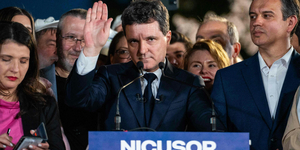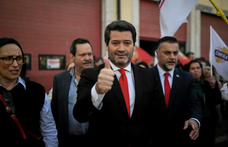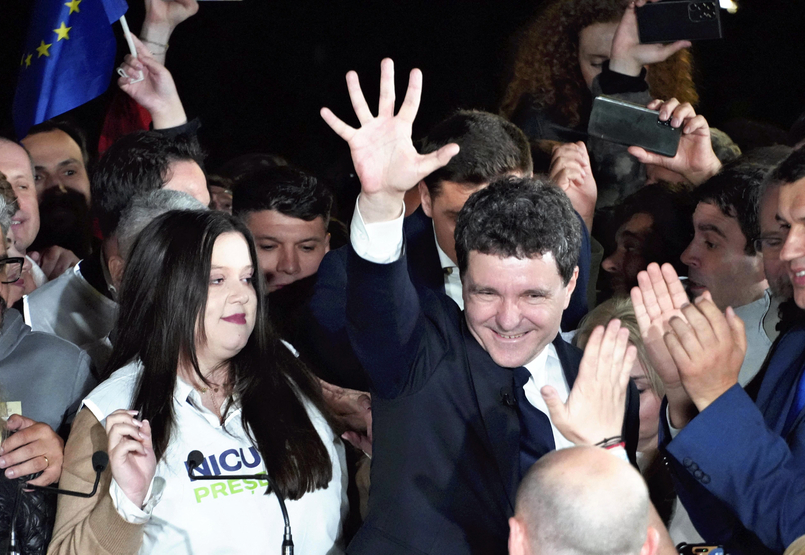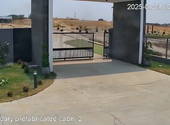Life after the Topolanszky interview
How does the Hungarian press read? Selectively. Some sentences mean more, others something completely different, while still others mean nothing, depending on the reading. The politicians in the spotlight know exactly what will be written about them the next day.
We suspected that our interview with Akos Topolanszky, who served as deputy state secretary in the Gyurcsany sport ministry, would kick up a storm. The interviewee made the same prediction. So it was no surprise that the phones started ringing yesterday afternoon, as the people mentioned in the article started contesting Topolanszky's claims, whether directly or via intermediaries. Several people asked us how the interview was conducted, wondering who or what had encouraged us to publish it. We told those people that our reporter had visited the former deputy state secretary, who talked about his experiences, and we had published that information. It seems the callers and their agents didn't believe us, since they talked about a "political commission". Attila Mesterhazy, the former state secretary and now deputy party group leader, said it was sad that a civil servant who claimed to be party neutral was acting as a tool of political propaganda. "The timing of his comments suggests this," he said.
The most tragicomic criticism of our article was that we had failed to ask for the views of all the people mentioned in our article. The well-known television producer complained about this, despite the fact that his morning show carries dozens of interviews a day, although we do not recall an occasion when the views of people mentioned in those interviews were sought. It's unclear why we would have done this, since those concerned would merely have repeated the prime minister's official view that no political pressure was placed on the ministry for children, youth and sport, and that every minister, state secretary and civil servant carried out his or her duties in accordance with their oath of office. Now, government politicians are demanding the allegations be examined swiftly and that any guilty parties be called to account. The reactions to our interview proved that we were right to suspect that any political response would be of little value. Our readers probably agree.
Yet in Jozsef Debreczeni's frequently-quoted biography of Gyurcsany, the prime minister said: "I kept the right of decision to myself in every important decision. I didn't allow the people who prepared decisions to take those decisions in my place." In the same passage, Andras Keszthelyi, sport minister Gyurcsany's chief of staff, says: "Gyurcsany soon had to contend with the Socialist Party's youth policy. This lax approach to grant aid, the whole culture, which ministers of the profile and prestige of Gyorgy Janosi had been unable or unwilling to deal with." On Wednesday morning, Gyurcsany told the television programme Moka how he had approached the decision-taking process. "There are several thousand grant applications, meaning the assessment process runs like a production line. "It's carried out by a ministry-owned company, and when the fat dossiers containing hundreds of decisions reach the minister, with each grant application represented by a single line, you have to imagine this dossier, line by line. It gets to the minister, who signs each page, and in that instant, we've decided on several thousand grant applications for summer caps, and everybody's signature is there, so you sign it." What a difference!
At a time of back-to-back scandals, the press bears a greater responsibility than normal. Let there be no misunderstanding: we are not thinking of political responsibility, which is not borne by the press, but of professional responsibility. Let us just observer that honestly reporting on scandals is not the same as writing a scandal sheet. You can live with an organ having political sympathies and opinions. It will still have an enthusiastic audience, if its bias can easily be recognised. But the public can legitimately demand that the press respect the facts when it reports on events. What happened when we published the Topolanszky interview is symptomatic.
The opposition press is jubilant. It is attempting to present the former deputy state secretary's statement as if it constituted new evidence that the current prime minister was the man behind behind the Socialist Party's leaking money machine. The right-wing daily Magyar Nemzet presents Topolanszky as one of a series. "Three former state secretaries are now claiming that grants are awarded on political grounds," the paper writes. But this involves three different cases. Tamas Ocsovai said he was following orders. He said this during a criminal investigation in which he could be named a suspect - so he is trying to pass the buck on to his superiors. Laszlo Szabo was not a deputy state secretary in the Medgyessy or Gyurcsany governments, but in Orban's, and he continues to serve as Fidesz delegate to the Hungarian Television board of governors. Topolanszky's case is different, since only his sense of justice forced him to speak. For example, he told hvg.hu that during the first, short period of Gyurcsany's ministerial career, he wanted to bring the irregularities under control, only rethinking this position when he started aiming for prime ministerial office. Unsurprisingly, Magyar Nemzet did not report on this particular assertion.
The left-wing daily Nepszabadsag takes another line. Ignoring the key points, the paper dwells on the positive elements of the story, saying, "the state secretary had some positive things to say" about Gyurcsany's performance. "He arrived like a fresh broom, trying to make the ministry operate more effectively... He said political pressure had to be brought under control and that lobbyists should be kept away... He still imagined he could be a unifying intermediary, somehow mediating between the Socialist Party and Fidesz," Nepszabadsag says, quoting our Topolanszky interview. The paper does not mention the broken promises, the related "budgetary tsunami", his change of heart or the circumstances of the deputy state secretary's dismissal. It's certainly an interesting editorial trick to give the article in question the headline, "Refreshed memories".
The paper clearly doesn't want to suggest to readers that somebody 'jogged' the deputy state secretary's memory. But then what do they want to say? Given the ramshackle state of Hungarian democracy and public opinion, we should be happy that there are some people who decline to keep their mouths shut and take genuine risks to reveal the truth. We journalists should be particularly glad of such people. And we have to reject the view that - in Gyorgy Szilvasy's words - Topolanszky's "memory is influenced by politics." (Curious - doesn't this remind us somehow of Nepszabadsag 's headline?)
The prime minister's spokesperson's reaction is also suspect: "The implication of the interview is a lie." Of course, the interview itself doesn't imply anything, and certainly not lies. Someone who knew that ministry's inner workings spoke about the same challenging circumstances that Gyurcsany and his former chief of staff discussed with Debreczeni. The article also shows that Topolanszky believes different Socialist politicians played different roles, and also that Ferenc Gyurcsany bears some of the responsibility. And neither the Socialist Party's crisis briefings, nor the statements of Mesterhazy's, Szilvasy's and Gyurcsany's spokespersons can hide this fact.
Zsolt Zádori
The most tragicomic criticism of our article was that we had failed to ask for the views of all the people mentioned in our article. The well-known television producer complained about this, despite the fact that his morning show carries dozens of interviews a day, although we do not recall an occasion when the views of people mentioned in those interviews were sought. It's unclear why we would have done this, since those concerned would merely have repeated the prime minister's official view that no political pressure was placed on the ministry for children, youth and sport, and that every minister, state secretary and civil servant carried out his or her duties in accordance with their oath of office. Now, government politicians are demanding the allegations be examined swiftly and that any guilty parties be called to account. The reactions to our interview proved that we were right to suspect that any political response would be of little value. Our readers probably agree.
Yet in Jozsef Debreczeni's frequently-quoted biography of Gyurcsany, the prime minister said: "I kept the right of decision to myself in every important decision. I didn't allow the people who prepared decisions to take those decisions in my place." In the same passage, Andras Keszthelyi, sport minister Gyurcsany's chief of staff, says: "Gyurcsany soon had to contend with the Socialist Party's youth policy. This lax approach to grant aid, the whole culture, which ministers of the profile and prestige of Gyorgy Janosi had been unable or unwilling to deal with." On Wednesday morning, Gyurcsany told the television programme Moka how he had approached the decision-taking process. "There are several thousand grant applications, meaning the assessment process runs like a production line. "It's carried out by a ministry-owned company, and when the fat dossiers containing hundreds of decisions reach the minister, with each grant application represented by a single line, you have to imagine this dossier, line by line. It gets to the minister, who signs each page, and in that instant, we've decided on several thousand grant applications for summer caps, and everybody's signature is there, so you sign it." What a difference!
Memory splotch (Oldaltörés)
At a time of back-to-back scandals, the press bears a greater responsibility than normal. Let there be no misunderstanding: we are not thinking of political responsibility, which is not borne by the press, but of professional responsibility. Let us just observer that honestly reporting on scandals is not the same as writing a scandal sheet. You can live with an organ having political sympathies and opinions. It will still have an enthusiastic audience, if its bias can easily be recognised. But the public can legitimately demand that the press respect the facts when it reports on events. What happened when we published the Topolanszky interview is symptomatic.
The opposition press is jubilant. It is attempting to present the former deputy state secretary's statement as if it constituted new evidence that the current prime minister was the man behind behind the Socialist Party's leaking money machine. The right-wing daily Magyar Nemzet presents Topolanszky as one of a series. "Three former state secretaries are now claiming that grants are awarded on political grounds," the paper writes. But this involves three different cases. Tamas Ocsovai said he was following orders. He said this during a criminal investigation in which he could be named a suspect - so he is trying to pass the buck on to his superiors. Laszlo Szabo was not a deputy state secretary in the Medgyessy or Gyurcsany governments, but in Orban's, and he continues to serve as Fidesz delegate to the Hungarian Television board of governors. Topolanszky's case is different, since only his sense of justice forced him to speak. For example, he told hvg.hu that during the first, short period of Gyurcsany's ministerial career, he wanted to bring the irregularities under control, only rethinking this position when he started aiming for prime ministerial office. Unsurprisingly, Magyar Nemzet did not report on this particular assertion.
The left-wing daily Nepszabadsag takes another line. Ignoring the key points, the paper dwells on the positive elements of the story, saying, "the state secretary had some positive things to say" about Gyurcsany's performance. "He arrived like a fresh broom, trying to make the ministry operate more effectively... He said political pressure had to be brought under control and that lobbyists should be kept away... He still imagined he could be a unifying intermediary, somehow mediating between the Socialist Party and Fidesz," Nepszabadsag says, quoting our Topolanszky interview. The paper does not mention the broken promises, the related "budgetary tsunami", his change of heart or the circumstances of the deputy state secretary's dismissal. It's certainly an interesting editorial trick to give the article in question the headline, "Refreshed memories".
The paper clearly doesn't want to suggest to readers that somebody 'jogged' the deputy state secretary's memory. But then what do they want to say? Given the ramshackle state of Hungarian democracy and public opinion, we should be happy that there are some people who decline to keep their mouths shut and take genuine risks to reveal the truth. We journalists should be particularly glad of such people. And we have to reject the view that - in Gyorgy Szilvasy's words - Topolanszky's "memory is influenced by politics." (Curious - doesn't this remind us somehow of Nepszabadsag 's headline?)
The prime minister's spokesperson's reaction is also suspect: "The implication of the interview is a lie." Of course, the interview itself doesn't imply anything, and certainly not lies. Someone who knew that ministry's inner workings spoke about the same challenging circumstances that Gyurcsany and his former chief of staff discussed with Debreczeni. The article also shows that Topolanszky believes different Socialist politicians played different roles, and also that Ferenc Gyurcsany bears some of the responsibility. And neither the Socialist Party's crisis briefings, nor the statements of Mesterhazy's, Szilvasy's and Gyurcsany's spokespersons can hide this fact.
Zsolt Zádori




















